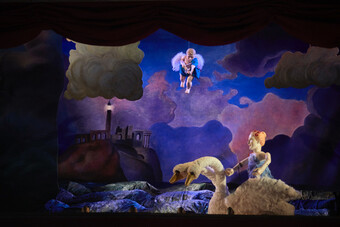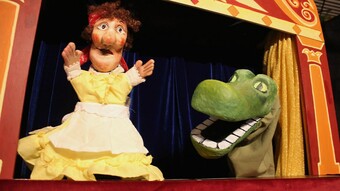Mike Lueger: Hey everyone, a quick note before we begin: This episode contains two brief mentions of sexual violence.
Welcome to the Theatre History Podcast, a podcast produced for HowlRound Theatre Commons, a free and open platform for theatremakers worldwide.
Hi, and welcome to the Theatre History Podcast. I'm Mike Lueger. Theatre artists from Shakespeare to Sondheim have looked to ancient Roman comedy as a model, but the world of Roman playwrights, such as Plautus, was a grim one, characterized by constant violence and the omnipresent institution of slavery.
How can we square this ugly legacy with the long-term influence of the plays that came out of such a world? Professor Amy Richlin has been exploring this question, most notably in her book, Slave Theater in the Roman Republic: Plautus and Popular Comedy. Professor Richlin is a professor of classics at UCLA who's written extensively about what she calls “out groups” and “muted groups” in the Roman Empire, and she's also translated a number of plays by Plautus. She won the Society of Classical Studies Goodwin prize in 2018, for this book, Slave Theater. And today we're lucky to have her as a guest on the show.
Amy, thank you so much for joining us.
Dr. Amy Richlin: It's a pleasure. I'm happy to be here.
Mike: Your book contends that slaves in the ancient Roman Republic, quote—I'm quoting directly here—“went to the theatre, and that their experiences shaped the early palliata, which primarily addressed slaves, freed slaves, and the poor.” So before we dig into that argument and a little bit about what it means, could you please give us a little bit of context, just starting with what the word “palliata” means?
Amy: Okay. The word “palliata” means dressed in a pallium—big help that is. So the pallium was a kind of a poncho, like what I'm wearing now, that was worn by Greeks. This is a form of Greek dress and would've been seen as such. And there's a pervading fiction in the plays that they are set in Greece, and the characters have Greek names, and this is all about Greece. But the scholar, Adrian Gratwick memorably said, and everybody echoes this, that “the plays are really set in what he calls Plautinopolis.” And I would push that a little further and say, that the plays are set in Rome. They were performed in Rome, and it was outside, and people were like sitting on benches in front of this temporary stage that was put up somewhere in the city, and all around them they could see Rome, and Rome very often pushes its head up through the words of the play.
So it's kind of set in Greece with a big wink; it's not really Greece, but this Greek outfit kind of let the actors get away with saying a lot of things that, they're not talking about Rome, they're talking about Greece. So this is a fiction that is played with and thrown up in the air and juggled with all throughout the plays. And it's a lot of fun.
So furthermore, not only is there a running joke in the plays about where they're actually being performed, and what Gratwick meant by Plautinopolis or sometimes Plautopolis, is that they're being performed nowhere; they're being performed in fantasyland. And I think that's very, very misleading. Because these plays often make topical, political critique of what's going on, let's say, in central Italy. Because I don't think these plays were only performed in Rome, I think that the actors toured around to various cities in central Italy. And it's just kind of for obvious reasons that we have them associated with the city of Rome itself, because, for example, Rome's next door, very powerful ally Praeneste—we don't have Praenestine literature, we have Roman literature.
So the plays are full of topical allusions to what's going on in these cities. Also, there's another running joke in which the actors talk about where they are as Barbaria, that is barbarian land. And this is what the Jamaican writer Michelle Cliff memorably called, “Claiming an identity they taught me to despise.” Because Greeks in this period thought of Italy and the west as barbarian land, just as the Greeks thought people who didn't speak Greek were barbarians. And there is a major reclaiming of that barbarian status of Latin as a language by the speakers in these plays.
And I think it is probably exclusively slaves who talk about themselves as barbarians, or about performers as barbarians or speak of themselves as being in Barbaria. And they don't mean to put themselves down. They are joking about other people's tendency to put them down.
From a top-down perspective, what does this mean? Rome in the two hundreds BC wasn't yet a world power. And if anything, the Hellenizing of the Roman upper classes was, at this point, still aspirational. They weren't players on the international literary scene, or their whatever it was they wanted to write or be, was they would not have been recognized as any great shakes in Greece, which was still very much occupied with its own personal meltdown.
So I think that this is tied in with the slave trade and the fact that a lot of the slaves that the Romans were taking were Greek-speaking because Greek was what was spoken in the south of Italy. So Rome, as yet, was still a central Italian power reaching out to clobber various non-Latin speaking groups within the peninsula of Italy.
And now increasingly with its great nemesis, da, da, da, Carthage, just across the Mediterranean, which spoke a Semitic language. So you see a multilingual cultural clash here. So, the fact that this form of drama was dressed in the pallium, was the palliata, is really, really a complicated phenomenon. And in the book, I used palliata as shorthand to mean early Roman comedy as written by Plautus and his earlier contemporaries. And it's a term of art used by experts in the field, but, yeah, it's not a term in common usage.
Mike: This world that you describe, these different sort of competing political entities and cultures within this world, as you write, slavery is this sort of constant presence. How did slavery function in the Roman world at this time?
Amy: Okay. It wasn't a Roman world, and I think only really people who are living in the city of Rome itself would've described it that way. I always start with Alexander The Great, who memorably died in the memorable year 323—3, 2, 3. Alexander's death cast a deep, deep shadow over the whole Mediterranean basin. The first thing Alexander did was completely steamroller the Greek city-state system in Greece itself. And then he marched through Asia Minor, which was very heavily Greek, and not to mention Persia and points east of there, he famously got to India. But the main thing is, that when he died very young, he left the eastern Mediterranean in the power of three of his successors, and they immediately fell to making war on each other.
And so the whole eastern Mediterranean is thrown into turmoil. And this has repercussions that soak into or reach out to the western Mediterranean. But the main thing that war did in that period, and throughout antiquity, is lead to incidents of mass enslavement. Because when a city was taken, they would, essentially, take all of the fighting age men out and shoot them. Or if they were not soldiers, but say just craftsmen and slaves, they would keep those. And then the women and children were all raped, and then they were enslaved, and they were marched off as slaves. There are harrowing descriptions of this from all over the Mediterranean, again, in this period and through late antiquity.
And the Greeks did it to each other, happily. Some cities had pacts between them where they wouldn't do it. But the Romans, meanwhile, in the Italian peninsula were one of a number of powerful city-states, including Tarentum in the south, Praeneste, their neighbor, and some other southern Italian cities. Well, they made war no differently and they would take slaves.
But the real difference comes in when the Romans fought Carthage for the first time in the First Punic War. And there was mass enslavement on the shores of North Africa of like ten thousand people at a time. And these people would then be divided up and some of them would be brought by... They were usually sold near the point at which they'd been captured, and then slave traders would take them and sell them. But a lot of them were sold into central Italy. And so you have an enormous demographic change within the Italian peninsula itself, as all these slaves come into the market from North Africa, as well as from southern Italy, when the Romans finally took Tarentum, which was this huge wealthy city in the south of Italy.
So those people were all Greek-speaking, but then people from the countryside around there and from, say, around Pompeii, spoke Oscan, a different language. And it's just like a huge mishmash of people. And then, also, due to war, people were not only enslaved but if they could get away, they were separated from their homes. Anyway, they were made nationless. They had to find refuge somewhere. They became refugees, basically.
So you can imagine the roads being crowded with groups of people, just walking along with their possessions, just what they could carry. Because often those were the terms of the defeat of a city after a siege; when the city surrendered, the people were sometimes let go just with what they could carry. So all the pictures you've ever seen of people walking down the road like that, these so-called caravans from Central America or anywhere in the world, just carrying what they could take, the things that meant were to them, with their children, leading their children by the hand, it would've been a common sight on those roads. “Displaced peoples,” that's what I was thinking about; displaced populations.
So within Italy, some of them would've gone to Rome, where they might have relatives or some hope of maybe finding somebody else who'd been lost. Then what really, really chops things up in Italy is the Second Punic War, the second war with Carthage, which started only about twenty years after the first one was over. And it was during the Second Punic War that Plautus' plays first began to be produced. And during that war, Hannibal invaded Italy, and he and his troops were in the peninsula for fifteen years, which as I like to use an analogy, that's three times as long as the Nazis were in France. So it must have had a major effect on the population, due to rape.
Mike: So out of these horrifying experiences, you get these plays, which as we've said, your book explores how those plays were shaped by the experiences of these people who have gone through these horrible, traumatic things, who had in many cases been enslaved. How did that come about? And what do the plays tell us about what it was like to be a slave at this time?
Amy: One of the things I'm trying to counter is this image that was propagated by Erich Segal. With the best of intentions, he analyzed these plays as Saturnalian, as part of a kind of carnival atmosphere, with these happy slaves who don't want to be freed, who say in the plays they don't want to be free. That is in fact not true. There are a couple of places where people say that, but in context, it really doesn't mean that they don't want to be free. Whereas many, many times slaves express an ardent desire on stage to be free.
So how does it relate to slaves' experiences? I believe very much that people joke about what they're afraid of, and they make jokes in comedy, sometimes, like whistling in the dark to keep... Well, I had a graphic illustration of it this spring, when I was teaching in comedy, this past spring, as the country locked down. And I had a class full of senior theatre majors and their hearts were just broken by what happened. They lost all the things they've been looking forward to, all their hopes and dreams. They had to give them up, and comedy, for some of them, was a way that they could start to get back on their feet.
And one of the final projects for the course, if you wanted to, for the theatre majors, you could stage a scene, and they're like, “How can we stage a scene?” And this is like the very beginning of people trying to stage things on Zoom. And I had a couple of students do a kind of IM back and forth of one of the scenes from one of Plautus' plays. That's kind of a very small to very big comparison of what the making of this comedy was like.
So for people who had lost everything, this comedy grew up; it was made out of the plotlines of Greek comedy of several generations earlier. When I first started working on this, I thought of the movie Kiss of the Spider Woman, where the main character is in prison, and he tells his cellmate, the plot of a movie called Kiss of the Spider Woman, as he remembers it. And they use this drama as a way of keeping their act together under the face of terrible brutality and misery. And I personally think that this borrowing of the Greek plotlines was similar to the borrowing of the screenplay of Kiss of the Spider Woman, the story.
So fine, they got the framework from these plays, but the Plautus plays feel nothing like those plays. You can see they're related, but they're being used for different... just because the cultural circumstances were completely different. They were playing for, I think, on a regular basis, whatever audience they could pick up in a town. I don't think that they just performed these plays for festivals. They had to eat. I think they performed them year-round, and that the best ones got picked up by the state authorities in some rich city to perform at the festival.
So they're performing for crowds. They had a temporary stage, which they carted around with them in a cart. And the people sat on benches, they didn't have a rake. Because in central Italy, there were no stone theatres in this period. This isn't allowed by the higher-ups in the state until 150 years after this time, more because they thought it was conducive to uprisings. They thought that it's in the theatre that these things get started. So they didn't want to have a stone theatre there.
So these troops are schlepping around. They themselves were low-status. Actors didn't have any prestige in central Italy in this time, that came, again, much later. Actually, about the same time as they started to build stone theatres. It took the Roman state a while to kind of glom onto the idea of, ooh, actors, celebrities, that that was a Greek thing. And it was a big Greek thing. In Greece, an actor was a big shot. They were called the “Companions of Dionysus.” They went from city to city and they would get inscriptions in their honor and the freedom of the keys to the city. This is heavily attested, and it's fascinating. It goes really far east into what's now Iran and Iraq, the Greek players were there. But in the western Mediterranean, not so much, and especially in the Latin-speaking part of it.
So at this time, these are rag-tag troupes of players. And some of them were clearly slaves, because there's jokes about that in the plays. So they're probably not all enslaved, maybe some of them were freed slaves, and some of the actors owned some of the other actors. And then in the audience are sitting whoever would come to hear them. They would pass the hat, if they were like contemporary Greek street performance, about which we do have a tiny shred of evidence about passing the hat.
But I saw a group very much like this at the Renaissance Fair in Michigan, a couple of autumns ago, not this past one. And I interviewed the troupe leader afterwards, because I thought, I am seeing what existed then. So one of the things we can tell also from the jokes in the plays is that this is comedy from below. The jokes that are made are jokes that are really about ordinary people. They don't have a rich person's perspective, au contraire. So they're critical of the upper classes, and especially critical of slave owners, especially of mean slave owners.
Mike: Yeah. I'm really interested in that idea, because I mean, I think plays by playwrights like Plautus kind of get lumped in with this larger idea that this is the sort of cultural historical legacy of the winners. The old cliché about “history is always written by the winners.”
It sounds like from what you're saying, they were performed by and possibly written by and performed for people who were really close to the bottom of society. I'm just curious, I mean, why does that matter? Why does that sort of reorient what we've traditionally thought about these plays?
Amy: Well, there's no doubt in my mind at all that the writers were also lower-class. It's pretty clear that Plautus himself, and I say brackets, Plautus or any one of these playwrights, because there were two before him, particularly a guy named Naevius, who was a Roman citizen, that they also acted in the plays, which again, at the time, was a pretty lowly thing to do. So there isn't really a bright line between the playwright and the actors.
And actually what really got me started on this was, there's a great historian of early Roman comedy, C.W. Marshall, and in the final chapter of his book, Stagecraft and Performance of Roman Comedy, he talks about how improv played a part in what was going on onstage. That is, to what degree were these plays scripted? And he's an Equity actor himself and he has done some work in improv, and he points to places in the play where you can see that improv is going on, or what I call, well, but you know what everybody calls shtick. But it's just like shtick in burlesque, where there's... I don't know if you've read any of the histories of burlesque, but they had like kind of scenario books, frameworks, and then for an old, seasoned comedian, there was all kinds of shtick that you could plug into these different plotlines, and old jokes where you go back and forth.
And there's a lot of that. There's runs of shtick in Plautus. I have an article called “The Traffic in Shtick” about the circulation of these jokes around the Mediterranean, because some of these jokes you do find in Greek... Some of them go back to Aristophanes and I'm sure predate him. And you find some actually in Egypt and Alexandria around 270, which is about say 40, 50 years before Plautus gets going. So you can see these jokes kind of circulating around the Mediterranean.
Anyway, but the big thing was, once he said that, that they were improvising on stage, I thought, Wait a minute, then this is slave theatre, because some of the actors were slaves. And if the troupe as a whole was participating in the making and the fabric of these plays, then this is really generated from this pretty low place on the social order.
Now, people have a tendency to lump all ancient writers together as upper class. And, in fact, there aren't that many upper-class writers from antiquity at all. When you think about it, how many aristocrats really have taken up the pen of a professional writer? That's a big question. In any case, in this period, the answer is, basically, maybe one: a historian. But at this point, the aristocrats didn't write, they had people to do that for them. So it wasn't even an upper-class thing, but was it backed by the upper class? Signs point to no. Later, only less than one hundred years later, Terence comes along, himself, probably a freed slave. He had a patron. Plautus did not have a patron. Naevius did not have a patron. These guys are just free-floating crumbs floating down the history river.
They didn't have a patron. And so little is known about them that for each of them, there's really only one short biographical paragraph floating around, also, in the ancient super-biography. Most people don't believe that these are real biographies, although I don't myself see any reason why it couldn't be real. And it locates Plautus as somebody who started out, he was working as an actor, and he was working on stage, and then he lost all the money that he had, and so much so that he had to go to work at a mill—a grain mill. Which was very, very, very low labor and something that was also used as a slave punishment. And the story is that, while he was working in the mill, he wrote two plays and then he gradually recouped, and went on to fame and fortune.
And then it's thought that he came from Sarsina in Umbria, which is the back of beyond, it's like saying he came from East Kneebone, Wyoming. It was a wild place in northern Italy, where they also didn't speak Latin. They spoke Umbrian. And so Latin would've been his second language. And that was true of a lot of the early... Actually, the few people that we know of in the early theatre, there's a sketchy biographical information, and also Latin was not their first language.
One of my favorite ones, Caecilius Statius, who was a little younger than Plautus, he's supposed to have been a Celt from northern Italy. The story goes that he was an Insubrian Gaul, that is, he was one of these Gaulish tribes that fought the Romans tooth and nail in the Po River valley up around Milan. And that he came from there. He came from up there, and somehow made his way down to Rome, and became a comic playwright.
This is the kind of story, and maybe I'm projecting then, but that we're familiar with from the theatre. The kid from nowhere who slams the door on his way out of the house, and says, “I'm going to the big city to make my fortune,” and occasionally does. Plautus' name in fact is just a silly stage name that he must have made up for himself. His name means as I've translated, so it was Titus Maccius Plautus, which translates to “Dick Harpo Clown Shoes.” So I don't think that was his actual name, just to guess here.
So it's comedy from below. At this point, there was also—see it exists, but only in fragments, so people don't really know about it or read it, you can't read it—at this point, there was also tragedy. And at these big festivals, there were horse races. So the aristocrats who were funding these festivals, they were into the tragedy apparently, to some degree, but everybody, like the main attraction at these festivals was the horse races, that's what people were there for. This was a side show. However, it very quickly, historically speaking, by two hundred years later, it became recognized that it was a very valuable side show. And so it was preserved by scholars.
Mike: So you're painting this picture of a world where there's this kind of lower-class artists, to some degree, talking about sort of the intermixing, the wars between the different parts of the Mediterranean world. It sounds like a kind of multicultural milieu. I'm curious too about where women fit into this, both specifically in terms of theatre, but also in how they appear in the plays—particularly with regards to women who are enslaved.
Amy: So I would just say that central Italian culture, but certainly Rome, about which we know the most, in general was much more coed than other ancient Mediterranean societies. So to have women on the streets or women present at a public festival, even very respectable women—really non-problematic. You'll sometimes hear it said that the audience was all male at the productions of ancient tragedy. It's possible that was true in Athens, which was, P.S., in parentheses, one of the most conservative Greek cities; other cities, in fact, may not have even considered having single-sex audiences. Athens, you could believe it. Although I tend to think, yeah, there were some women there or women standing in the back. But in central Italy, it wouldn't have been a problem for women to be present.
So were they in the audience? One of the plays has a prologue, this was a common structural feature of these plays, to start with a prologue. And the play Poenulus has a prologue where somebody who's in the cast, but he's not playing a role, he's just being the prologue speaker, he comes out and he gives directions to the audience. He starts bossing the audience around, and he says all these funny things. He says, “No overage boy prostitutes sitting on the stage, get out of here.” And then he tells all the women, married ladies to “be quiet and stop yakking, and don't be a pain to your husbands here, like you are at home.”
He gives a shout-out to nannies, to slave nannies. Well, he doesn't say “slave nannies,” he just says “wet nurses.” But this was, typically, a slave position, who are there with the little children. He says to keep the babies home or take them home, so you can nurse them. And then he addresses slaves in general, and he addresses people who get up late and just like some acting troupe—well, our local acting troupe—he yells at latecomers and he does all this stuff.
So in terms of women in the audience or slaves in the audience, were they there? I think the Poenulus prologue proves, conclusively, that they were there, and there are a few other prologues and jokes in the plays that give shout-outs to or directions to slaves who are also audience members. In addition, there are jokes inside the plays where a slave character talks about something he's seen at the theatre recently. These are like metatheatrical lines where people... And they're clearly like inside jokes for people who like to go to the theatre a lot.
I mean, if you work with comedians or if you try to stage comedy, it seems to me just overwhelmingly clear that you don't say, “No overage, teenage prostitutes sitting on the stage,” unless you've got a couple of guys sitting on the edge of the stage, who can then leap up and move off; maybe they're plants. Okay. But there's like somebody there. Likewise, you don't shout out to people in the audience like to be quiet unless there are. And that this is being recognized from the stage like this, is one of the great delights of going to see comedy. My husband and I like to go to Cirque du Soleil, and one time a clown picked on my husband to chase around the audience. I have really hardly ever seen my husband so delighted, and he was laughing. It's wonderful.
But a very distinguished scholar of Plautus, Peter Brown, who very sadly died, gosh, sometime in the recent past—which is now just a general storm of misery. Anyway, Peter Brown argues that, “No, these are actual, literally, meant commands to stay away. Proving that women were not allowed to be there. And slave women with little children were not allowed to be there. And all these other people who are told to leave actually were not allowed to be there.” Oh, like there's a line that says, “Slaves, move over. If you're taking up too much room, move over and make room for the free or else pay for your freedom.” And I think this is teasing of people who are actually there. I don't think the joke is that, of course, they could not be there, but there are two points of view on that. Just being fair about it. However, I am right. So, all right—















Comments
The article is just the start of the conversation—we want to know what you think about this subject, too! HowlRound is a space for knowledge-sharing, and we welcome spirited, thoughtful, and on-topic dialogue. Find our full comments policy here